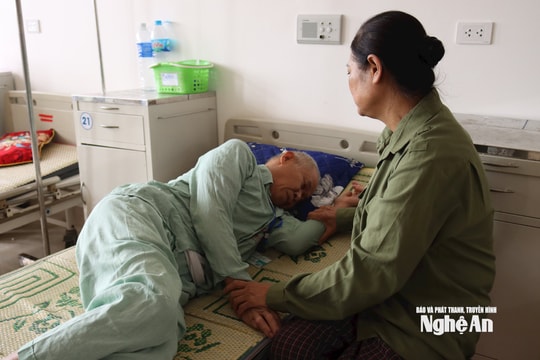Experts state 3 reasons why cancer patients are getting younger
Vietnam is one of the countries with the highest cancer rates in the world and is showing a “younger” trend. One of the reasons is that young people are exposed to cancer-causing agents at an increasingly early age.
Doctor Ha Hai Nam, Deputy Head of Abdominal Surgery Department I (K Hospital), commented that the age of cancer is getting younger. Previously, cancer patients were usually middle-aged (after 40 years old). Currently, the age of cancer patients has gradually decreased, with many cases of 20 and 30-year-olds having been diagnosed with cancer.
Male doctor cited 2 cases of infectioncancerYoung adult breast disease - a disease that was previously only found in middle-aged and older women. One female patient was 27 years old and the other was in her 30s. The patient felt a lump in her breast and went to the hospital for examination.
In addition, Dr. Nam also cited the case of a 34-year-old male patient who was shocked when the doctor informed him that he had liver cancer.
The man was advised by the doctor to be hospitalized for biopsy and treatment because the tumor was about 6-8 cm and several smaller tumors. His wife was present at the clinic with him, both of them were very shocked. The patient shared that his father had died of cancer, and he had just had a small child, so the results were very surprising to him, especially at his young age.
 |
Take time to exercise every day. Photo Internet |
"In the past, when talking about cancer, people often talked about middle-aged people and older. However, nowadays, cancers in general are getting younger. Cancer in young people often develops quickly," said Dr. Nam.
Explaining the situation of cancer getting younger, Deputy Head of Abdominal Surgery Department I (K Hospital) said that the level of medical science has developed, besides that the level of concern for people's health has also increased. Therefore, there are many cases of cancer being detected at a very young age.
In addition, young people are also exposed to carcinogens at an early age. Doctors analyze that there are three main carcinogens, including physical agents (radiation, sunlight, etc.); chemical agents (dyes, etc.); biological agents (HP bacteria, hepatitis B, etc.) found in beer, alcohol, and food and drinks.
Nowadays, young people are exposed to risk factors and accumulate these factors earlier. For example, young people drink alcohol early, smoke, eat fast food (french fries, fried foods, etc.). Therefore, the accumulation and transformation process occurs earlier than before. This will promote abnormal cells (cancer) to develop earlier than age.
Another reason mentioned by Dr. Nam that makes cancer more common in young people is a sedentary lifestyle.
 |
Healthy eating is very important. Photo Internet |
Doctor Nam commented: "Many people who work in offices sit a lot and do little exercise. In the evening, they also spend time staying up late watching TV on their phones... Going to bed too late will affect the body, changing the internal environment in the body (endocrine). This causes biochemical reactions in the body to not take place in balance and completeness, leading to changes in DNA, which in turn causes cancer."
To prevent cancer from "visiting" early, this cancer specialist advises everyone to minimize all risk factors. Young people whose family members have cancer need to be carefully screened, because this group of people has a higher risk of cancer than others.
For example, if your father and your father's brother have colon or stomach cancer, you should get checked and screened for this cancer. Or if your mother, aunt or paternal aunt have breast cancer, you need to get screened for breast cancer... Screening time is once a year. People should pay attention to the time for cancer screening after the age of 30. In the group of young people with a family history of cancer and a sedentary lifestyle, the risk of cancer increases.
According to Dr. Nam, cancer prevention is not difficult and has been discussed a lot by experts. The first thing is that young people need to have a healthy lifestyle, increase physical activity and have a balanced diet.
According to information from K Hospital, it is estimated that about 50% of cancers can be prevented. In which, step 1 prevention is primary prevention to try to eliminate or minimize exposure to carcinogens to prevent the onset of cancer.
Smoking: Causes about 21% of all cancer deaths worldwide, including 90% of lung cancer, 75% of oral, esophageal, hypopharyngeal and laryngeal cancers, 5% of bladder cancer and many other types of cancer. The risk of cancer increases with the duration of smoking, passive smoking is also a risk factor.
Improper nutrition: Nutritional factors are ranked as the second most important cause of cancer. Avoid eating too much fat, spices, moldy foods (which produce cancer-causing aflatoxin) and avoid drinking water or eating food that is too hot.
Alcohol:causes cancer of the liver, oral cavity, esophagus and upper larynx. It is necessary to increase the intake of fruits, vegetables and vitamins. Vitamins, especially β Carotene in red fruits and vegetables (carrots, tomatoes...) have anti-cancer properties.
Environmental factors:Some environmental factors are linked to cancer such as radiation (ultraviolet radiation from the sun is linked to skin cancer and ionizing radiation in X-rays and CT scans is linked to many types of cancer such as thyroid cancer and leukemia), air pollution (increased risk of lung cancer), and water contaminated with arsenic (linked to bladder cancer).
Obesity:Obese people have a higher risk of cancer than normal people and are the cause of about 20% of cancers such as esophageal, stomach, colorectal, liver, ovarian, pancreatic, postmenopausal breast cancer...
Lifestyle:A sedentary lifestyle is also the cause of about 5% of cancer deaths. Therefore, regular exercise at an appropriate level will reduce the risk of cancer.
Infection:It is estimated that about 17% of new cancers worldwide are related to infection. Several viruses are known to cause cancer in humans, including hepatitis B virus, Epstein-Barr virus, human papillomavirus (HPV) and human T-lymphocytic leukemia virus (HTLV). Therefore, hepatitis virus infection can be prevented by vaccination, and cervical cancer can be prevented by vaccination against certain types of HPV, especially types 16, 18, 31 and 45.
Genetic factors:Family history is also considered a risk factor for some types of cancer such as breast cancer, colorectal cancer, retinoblastoma, xeroderma pigmentosum. In some countries, there are genetic clinics to find cancer-causing genes. Prevention by some measures such as xeroderma pigmentosum should not be exposed to sunlight or polypectomy, colonectomy in familial polyposis.


